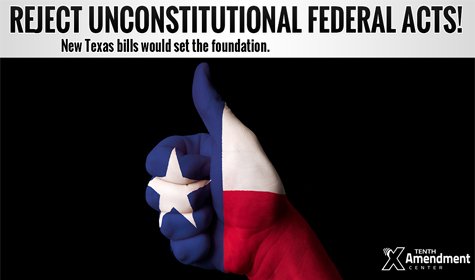AUSTIN, Texas – During the 2017 session, the Texas legislature will consider bills creating a mechanism to review federal laws and end state cooperation with enforcement of those that violate the Texas Bill of Rights. This process would set the stage to effectively block some federal laws in the Lone Star State.
Sen. Bob Hall (R) filed Senate Bill 89 (SB89) and Joint Resolution 7 (SJR7) on Nov. 14. The legislation would create a process whereby the Texas legislature could find a federal law violates the Article I of the Texas constitution. Once the legislature makes such a finding the state would be prohibited from assisting in the enforcement of that federal law.
SB89 would create the review process by statute. SJR7 would place the matter before the Texas voters as a referendum in the next general election.
Section 1 of the legislation declares, “It is the policy of this state to refuse to provide material support for, or to participate in the execution or enforcement of, any federal law that the legislature finds to violate the Bill of Rights of this constitution.”
Under the proposed law, the Texas House or Senate could bring a federal law before the legislature for review by a petition signed by the majority of members in that chamber. The bill would also create a joint interim committee that would convene when the legislature is not in session to review federal laws. The governor would be required to call a special legislative session when the committee finds that a law possibly violates the Texas Bill of Rights.
The legislature would be required to review federal laws brought before it through petition or by the joint committee. If the majority in both houses finds the law violates Article 1 of the Texas Constitution, it would end all state enforcement of that federal act,.
A state agency or political subdivision, or an officer or employee of a state agency or political subdivision, may not execute or enforce a provision, penalty, or sanction provided by a federal law that the legislature has found under Section 3(a) to violate Article I.
Rep. Dan Flynn also filed a bill (HB74) that would create a similar process to review federal law and make “recommendations for effective and constitutional legislative responses to the federal action.”
EFFECTIVE
Based on James Madison’s advice for states and individuals in Federalist #46, a “refusal to cooperate with officers of the Union” provides an extremely effectively method to render federal laws, effectively unenforceable because most enforcement actions rely on help, support and leadership from the states. This legislation could effectively end enforcement of federal laws deemed to violate the Texas Bill of Rights. This includes the right to be free from unreasonable searches and seizures and the right to keep and bear arms.
Fox News senior judicial analyst Judge Andrew Napolitano agreed this type of approach would be extremely effective. In a televised discussion on federal gun laws, he noted that a single state refusing to cooperate with enforcement would make federal gun laws “nearly impossible” to enforce.
The federal government relies heavily on state cooperation to implement and enforce almost all of its laws, regulations and acts. By simply withdrawing this necessary cooperation, states can nullify in effect many federal actions. As noted by the National Governor’s Association during the partial government shutdown of 2013, “states are partners with the federal government on most federal programs.”
LEGAL BASIS
This legislation rests on a well-established legal principle known as the anti-commandeering doctrine. Simply put, the federal government cannot force states to help implement or enforce any federal act or program. The anti-commandeering doctrine is based primarily on four Supreme Court cases dating back to 1842. Printz v. US serves as the cornerstone.
“We held in New York that Congress cannot compel the States to enact or enforce a federal regulatory program. Today we hold that Congress cannot circumvent that prohibition by conscripting the States’ officers directly. The Federal Government may neither issue directives requiring the States to address particular problems, nor command the States’ officers, or those of their political subdivisions, to administer or enforce a federal regulatory program. It matters not whether policy making is involved, and no case by case weighing of the burdens or benefits is necessary; such commands are fundamentally incompatible with our constitutional system of dual sovereignty.”
UP NEXT
The legislation will be assigned to a committee once the regular session begins next year. It will have to pass through the committee process before moving on to the full Senate (or House in the case of HB74) for further consideration.
The Tenth Amendment Center is a national think tank that works to preserve and protect the principles of strictly limited government through information, education, and activism. The center serves as a forum for the study and exploration of state and individual sovereignty issues, focusing primarily on the decentralization of federal government power as required by the Constitution. This article originally appeared at: http://blog.tenthamendmentcenter.com/2016/11/texas-bills-would-create-process-to-review-and-block-unconstitutional-federal-acts/

